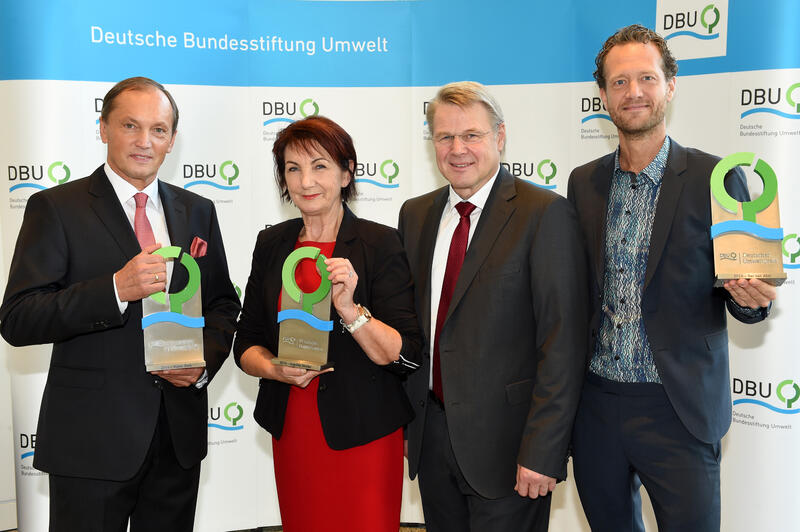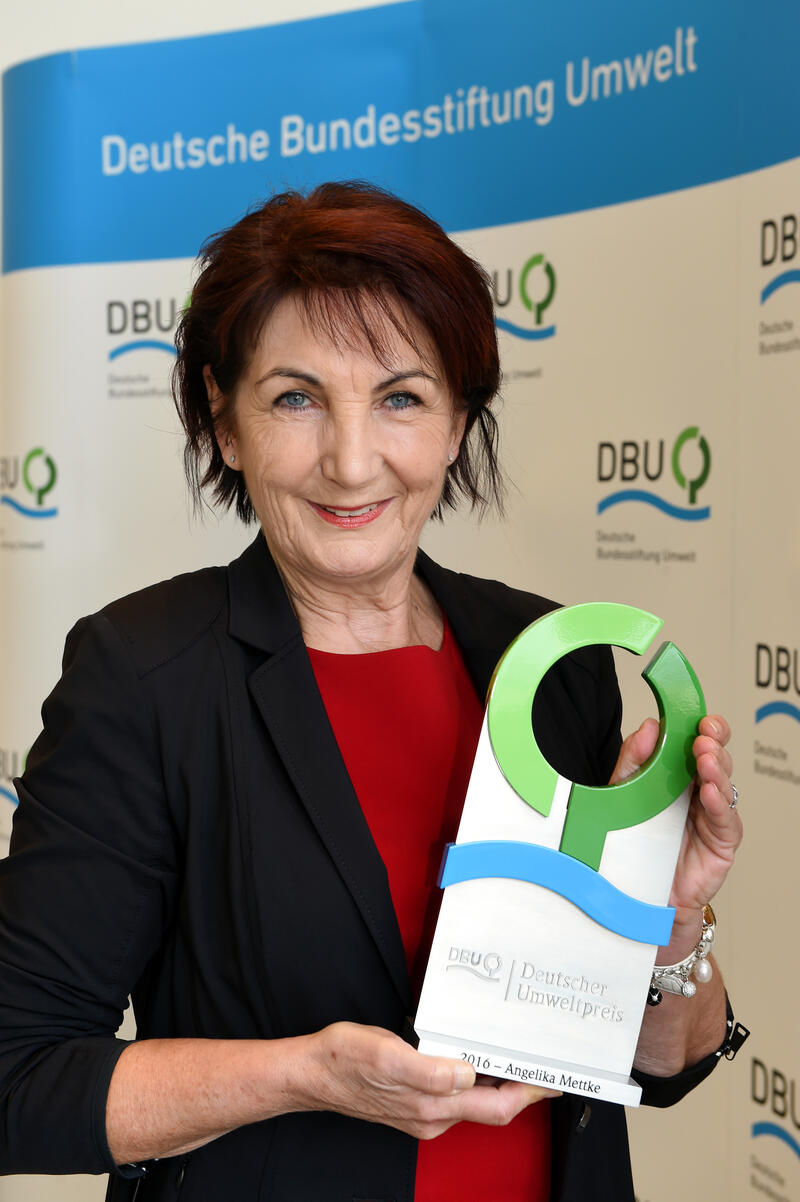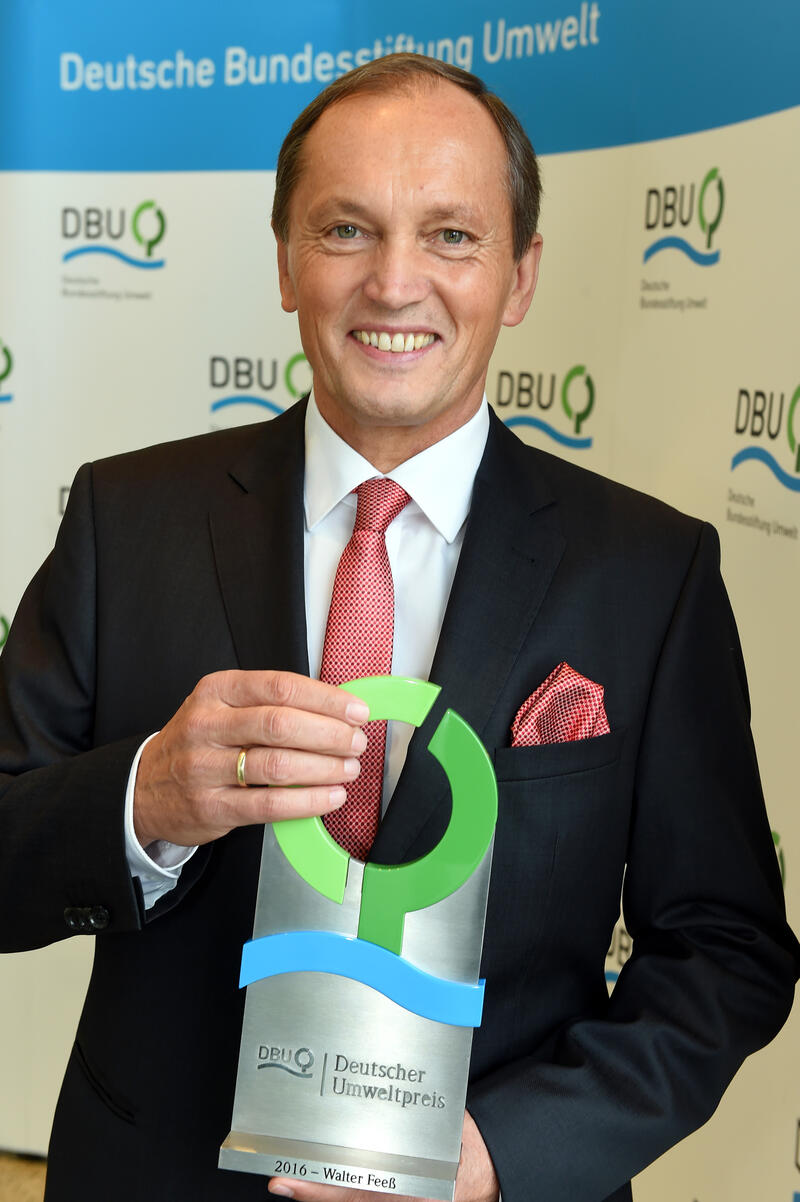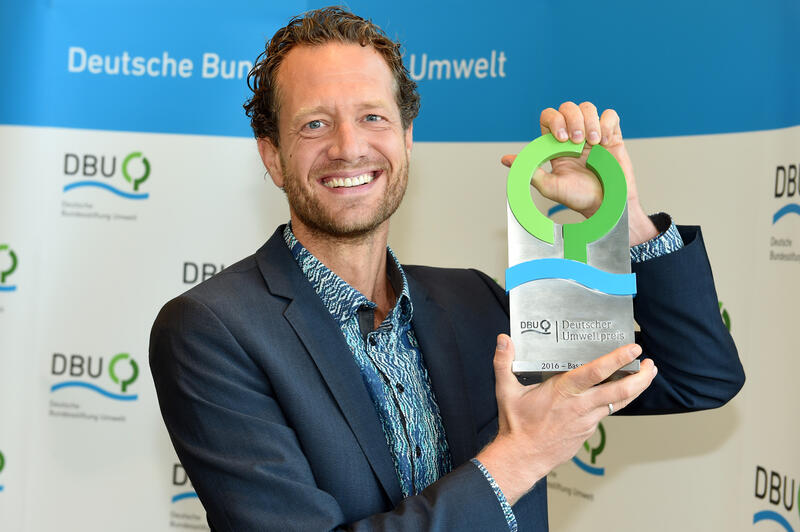German Environmental Prize message: better protection and more sustainable use of our natural resources
Würzburg. The German Environmental Prize of the German Federal Environmental Foundation (Deutsche Bundesstiftung Umwelt, DBU) has been awarded for the 24th time. The prize, the highest-endowed independent award of its kind in Europe, was presented personally by German President Joachim Gauck and the DBU Board Chairperson and Parliamentary State Secretary of the Federal Environmental Ministry, Rita Schwarzelühr-Sutter, to the entrepreneur Bas van Abel (39, of Amsterdam), the scientist Prof. Dr.-Ing. Angelika Mettke (64, of Cottbus), and the entrepreneur Walter Feeß (62, of Kirchheim/Teck) today. With this award to pioneers and creative trailblazers in the protection and sustainable use of natural raw materials, the DBU seeks to draw attention to the fact that decisive action is urgently necessary in order to secure the basic elements of life for future generations. In some respects the Earth has already been taxed past the breaking point. Van Abel receives 250,000 euros, and the other half of the prize money will be divided between Mettke and Feeß.
Longer life cycles for smartphones and concrete
DBU honored the founder and Managing Director of Fairphone B.A., Bas van Abel, because he has found new methods in the information- and communications industry to work against the excessive consumption of cellphones and smartphones. Angelika Mettke, of the Brandenburg Technical University (BTU) of Cottbus-Senftenberg and Walter Feeß, Managing Director of the Heinrich Feeß GmbH & Co. KG, have promoted and advanced reusable concrete parts and recycled concrete. In both industries, the degradation of raw materials is destroying extensive natural habitats. There are options, however, for halting this excessive use and abuse, by making longer life cycles for the products a priority – whether smartphones or concrete.
Van Abel: Improving Social-, worker safety- and environmental standards on location
Van Abel pursues the goal of manufacturing a smartphone produced according to ethical principles, with the least possible harm to the environment and without exploiting humans. Individual components of the easily-repaired Fairphone such as battery and display can be replaced, so that raw materials are saved through longer life cycles, and materials circuits are closed through recycling. Social-, worker safety- and environmental standards are to be improved on location, so that persons in conflict regions can be employed under fair conditions and the impact on the environment is the least possible. Fairphone has developed strategies for the entire value chain in order to improve the conditions which are currently dominant. Thus Fairphone has consciously issued a challenge to the typical current mobile telephone, which is assembled with valuable metals and components that can often be extracted only at the cost of substantial damage to the environment -- and which, after only a few years, is phased out of production or thrown away, although it is still fully functional.
Mettke and Feeß: broken through rigid structures in the raw material business
Mettke and Feeß have broken through rigid structures in the raw material business, begun to curb the thoughtless use of natural resources, and have given new importance to the phrase “utilize instead of dumping”. There is also the related problem of excessive land use: for conventional concrete, gravel is excavated in huge pits and transported long distances between quarry and construction site. The land use involved is immense and leaves behind barren landscapes which can only be renaturalized with great effort and cost. In addition, valuable space for agriculture and forestry is lost.

© DBU/Peter Himsel
Environmental problems associated with demolition and deconstruction perceptible to a broad public
Using concrete rubble from demolition sites for recycled concrete is an important and fundamental step toward limiting wasteful land use and reducing the use of landfills. Mettke has made the environmental problems associated with demolition and deconstruction perceptible to a broad public, redesigned materials cycles, and has thereby provided a basis for the creation of many new qualified jobs. As a trailblazer in recycling concrete, Feeß has demonstrated entrepreneurial courage in building a flourishing construction materials business. Both have addressed the central issues involving origins, manufacture and circular economy, and have attempted to change and improve aspects of the system.
Entrepreneurs have to be more consciously the way they deal with resources
In videos produced during the awards ceremony, the recipients again stated clearly their positions and attitudes. Van Abel emphasized his vision that entrepreneurs will more consciously address their business models and the way they deal with resources: “At the moment, unfortunately, it’s like this: economically, things are improving, but ecologically we’re headed over the cliff. We must create a balance there. Economy and ecology must come together, they must go hand in hand. For me, that is the future.” He stated that we know about the terrible working conditions under which different minerals required for smartphones are extracted. We know about “everyday child labor”, that there are no fairtrade mines in the Congo, that there is war there and people have nothing to eat, “but we don’t see the connection between the products and this suffering.” For that reason, the most important thing for him was to point out these relationships. Van Abel: “We want our customers to know their Fairphone and feel responsible for it. And to use their mobile telephone for as long as humanly possible. Because with five years of use instead of two and a half years of use, only half as many smartphones have to be manufactured. And that represents a giant contribution to environmental protection.“
Two million tons of construction waste could be avoided each year
Mettke insists that people must go through a rethinking process: our natural resources, which are not available in infinite amounts, must be better and much more carefully used. She once estimated, she says, that each year two million tons of construction waste could be avoided if the concrete slabs were to be reused – but no one talks about these potential savings in materials and energy. Furthermore the quality of the used concrete elements has been repeatedly questioned, although she has “tested over a thousand concrete elements, of various construction types” and has “been able to establish sensational high strength values”.
Fulfill our responsibilities to coming generations
Feeß, too, admits that he “often feels left alone” and is involved in a constant struggle. The acceptance of recycled materials and recycled concrete is not so easy to achieve. This is the case although the advantages are plain to see. His company processes waste where it accumulates. This saves an “enormous amount of truck mileage” and reduces transportation routes, noise, carbon dioxide- and particulate matter emissions. Feeß: “A gigantic advantage for our environment.” He hopes fervently that the government will set the good example that it should, and will more often construct its buildings with recycled concrete, because then “private companies will follow suit that much faster.” It is his vision that “at some point people will get infected and realize that there is no alternative. If we want to achieve our climate protection goals, if we want to fulfill our responsibilities to coming generations, then we must recycle more of our waste.”

© DBU/Peter Himsel

© DBU/Peter Himsel

© DBU/Peter Himsel